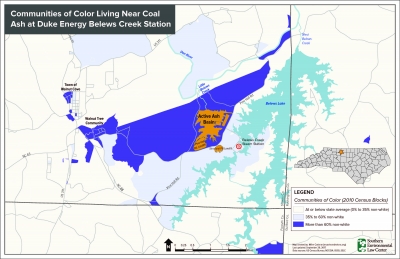Citizens go to federal court over Duke Energy coal ash pollution in Dan River Basin
Today SELC filed in federal court to stop Duke Energy’s violations of the Clean Water Act at its Belews Creek facility in Stokes County, north of Winston-Salem. Duke Energy’s Clean Water Act violations at the site include dumping its coal ash pollution into the Dan River, Belews Lake, Little Belews Creek and groundwater through its malfunctioning wastewater treatment system, and illegally using the creek as part of its wastewater dump. The suit was filed on behalf of Appalachian Voices, the Stokes County Branch of the NAACP, and the North Carolina State Conference of the NAACP.
“Duke Energy’s long history of polluting the water in this community with its coal ash at Belews Creek must stop,” said Attorney Myra Blake. “Duke Energy is continuing to pollute the groundwater and creek connected to Belews Lake and the Dan River—and plans to do so into the future—despite the harm it has already caused and the concerns voiced repeatedly by the community near its leaking, unlined coal ash pit at Belews Creek. It’s way past time for Duke Energy to stop polluting this community’s groundwater and waterways.”
Duke Energy’s illegal coal ash pollution has contaminated groundwater, Belews Lake, Little Belews Creek, and the Dan River with elevated levels of many pollutants, including: arsenic; barium; boron; bromide (linked to carcinogens in downstream treated drinking water for Eden, N.C. and Madison, N.C.); chloride; chromium (including hexavalent chromium); mercury; molybdenum; radionuclides; selenium; sulfate; strontium; thallium; and vanadium.
Despite its long history of leaks and pollution resulting in fish kills and carcinogens in downstream drinking water, Duke Energy has proposed to cover up its unlined, leaking coal ash pit at Belews Creek, allowing continued pollution of groundwater and the nearby waterways.

Belews Creek Demographics
Census data illustrates the high concentration of African-Amercians living around the active coal ash site at Belews Creek Steam Station.
“Duke Energy has dumped its coal ash pollution into our community’s waters for decades, and now it wants to leave the coal ash sitting in our waters for eternity,” said Reverend Gregory Hairston, Stokes County NAACP President. “We deserve better than that.”
Duke Energy’s Belews Creek coal ash site sits in the middle of a predominantly African American community, near Walnut Tree, N.C. In response to testimony at a hearing near Belews Creek, the Advisory Committee to the U.S. Commission on Civil Rights concluded “the minimum standard for all coal ash storage is in lined, watertight landfills away from drinking water sources.”
“This is a quintessential example of environmental injustice,” said Reverend Dr. T. Anthony Spearman, North Carolina NAACP President. “In a county that’s predominantly white, Duke Energy’s polluting coal ash pit sits in the middle of a mostly black community of limited means.”
Duke Energy has admitted that groundwater contaminated with coal ash pollution at Belews Creek flows beyond Duke Energy’s property boundary. In 2015, residents who rely on more than a dozen drinking water wells near the Belews Creek coal ash pit were told by the state not to use their water for drinking or cooking due to elevated levels of arsenic and other pollutants.
Through court orders and agreements with citizens groups and regulators, Duke Energy is required to excavate its ash and move it to dry, lined storage at ten of its sixteen sites in the two Carolinas. However, Duke Energy refuses to commit to cleaning up its Belews Creek coal ash site and five other coal ash sites in North Carolina, which are the subject of ongoing litigation in state court in which Appalachian Voices is a party represented by SELC; several of these sites are also the subject of ongoing federal suits against Duke Energy for violations of the Clean Water Act and the EPA’s federal coal ash rule. In 2015, Duke Energy companies pleaded guilty 18 times to nine coal ash Clean Water Act crimes committed across North Carolina and remain under criminal probation.
